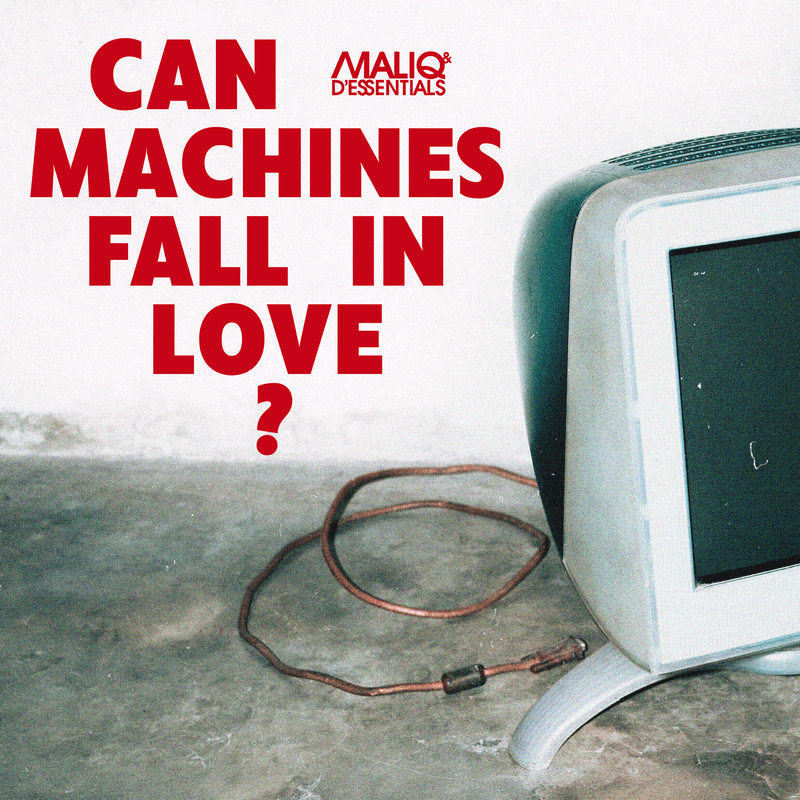Their seventh full-length album is the group’s most modern record to date, though it lacks a certain, status-defining ingredient.
I would dare to say that, if the younger Indonesian artists out there were looking for a role model in terms of how to map out a career in music, MALIQ & D’Essentials should be (no pun intended here) The One.
Perhaps MALIQ & D’Essentials’ biggest accomplishment is how they have managed to define their identity and reputation beyond the era during which they first started out. While most of their peers have been relegated as merely the voice of the 2000s, MALIQ & D’Essentials transcended and more. Cut to the present, most music audiences (myself included) must feel mystified by the fact that the group’s latest album, Can Machines Fall in Love?, is already their seventh full-length album — not to mention, their live album and a couple of EPs in what is nearly a 20-year discography. The new release by MALIQ & D’Essentials never feels like a comeback, and the group’s hiatuses never feel like a red flag. In addition, regardless of the changing eras and generations, their music continues to stay relevant. It is a career worthy of envy and admiration.
Still and all, no musician is perfect, and MALIQ & D’Essentials is no exception. Somehow, in such a storied career, MALIQ & D’Essentials has not exactly given birth to the group’s masterpiece. An album that MALIQ & D’Essentials, its fans, and music critics can confidently declare as the group’s magnum opus. There was always a thing or two that prevented the group’s previous albums from joining the ranks of Dewa 19’s Pandawa Lima or Sheila on 7’s Kisah Klasik Untuk Masa Depan. For example, MALIQ & D’Essentials’ freshman full-length album, 1st (2005), was, indeed, one of the most glowing debut albums by an Indonesian music act in the 21st century, but it was also both overlong and underproduced. Their 2017 album, Senandung Senandika, was MALIQ & D’Essentials at their most fearless, but alas, this record (and almost all of the Indonesian records in the years 2016 and 2017) got overshadowed by the Tulus’ colossal Monokrom.
Personally, I wished that MALIQ & D’Essentials’ seventh full-length album, Can Machines Fall in Love?, could be the masterpiece that I had been looking for. The immediate success of the album’s lead singles, “Aduh” and “Kita Bikin Romantis”, already hinted at the group’s overdue ascendance to the league of legends. This year is supposed to be their year – just like how Dewa 19 practically owned the year 1997 and how Sheila on 7 basically dominated Y2K.
Sadly, Can Machines Fall in Love? is not a masterpiece.
Let’s start with the good stuff about the album.
To no one’s surprise, the group’s chemistry in Can Machines Fall in Love? remains unscathed. Angga Puradiredja, Widi Puradiredja, Indah Wisnuwardhana, Dendy Sukarno a.k.a. Jawa, Arya Aditya Ramadhya a.k.a. Lale, and Ilman Ibrahim continue showcasing their teamwork-is-dreamwork magic, proving that certain exuberance can only be formulated as a group as opposed to a solo act. The album’s fifth track, the wholesome-to-the-max “Kita Bikin Romantis“, presents what happens when six different puzzle pieces come together in unison and create a swoon-worthy scene that a pop soloist can only dream of. In terms of vocals, Angga Puradiredja and Indah Wisnuwardhana are at their peak charisma. No ego over here; only sincere chemistry.
The overall sonic direction of Can Machines Fall in Love? might come off as polarising for certain listeners. The older music audiences, especially the ones who have become devoted fans of the group since “Untitled” became every Indonesian high schooler’s guilty pleasure back in the year 2005, might prefer the more earthy sound of 1st (2005) or the lyrically daring mode of Musik Pop (2014). I, myself, am still stunned by the fact that the group that recorded the quaint, yet remarkably meditative “Himalaya” and “Semesta” is the same group that also recorded the lyrically repetitive “Aduh“.
That is, however, where MALIQ & D’Essentials excels: the group’s conscious refusal to repeat the sound of their past discography while still preserving their core DNA. The lyrical style of Can Machines Fall in Love? is pretty much in tune with what the streaming-obsessed youngsters are very much into these days – lyrics that are quotable, demanding a double read, unabashedly in-your-face, with zero subtlety. Some audiences might see this as the group deliberately pandering to Gen Z, but the truth is a proper musician must understand all too well that their artistry is a two-way communication between the creator and the consumer. Sometimes, to make your points come across, you must be able to speak in your audience’s language, and that is what MALIQ & D’Essentials did.
The lyricism and production of the album’s sixth number “Begini Begitu“, a track I declare the best song of the entire Can Machines Fall in Love?, is as uncomplicated and as back-to-basics as it can be. Having said that, “Begini Begitu” totally nails what the current pop music enthusiasts are adoring the most: pop music wrapped in the purest package possible. “Terus Terang” is, essentially, Maliq & D’essentials’ slight exploration into the so-called Happy-Sad movement — a subgenre that the younger audiences tend to appreciate better than the older, Adult Contemporary connoisseurs. From the audio side of things, Can Machines Fall in Love? Is probably their ‘cleanest’ album yet; a record that provides maximum pleasure even when played in a car stereo or a wired headset.
And then, there comes the gigantic hooks. If anything, regardless of how the music audiences would evaluate the album’s lyrics and production, Can Machines Fall in Love? should become the bible of how to craft the most addictive, delicious pop hooks ever. After only one listen, the beat and the melody of “Kita Bikin Romantis” and “Begini Begitu” have immediately stayed, rent-free, in my head. Such is the product made by experienced and well-seasoned hands and ears. Personally, I do hope that the commercial success of Can Machines Fall in Love? continues to grow, sending an inarguable statement to the Indonesian music industry that young age is not the only currency of a musician’s popularity.
But here’s the awkward part.
When all is said and done, the reason why Can Machines Fall in Love? is still not sparkling enough to earn a masterpiece status is an old flaw that has evolved into a frustrating, hopefully-not-permanent habit of MALIQ & D’Essentials: their reluctance to go raw and explore the uglier realities. Historically, conveying emotional conflicts and the darker perils of a human heart is rarely MALIQ & D’Essentials’ strongest suit, and such incapacity remains unsolved here in Can Machines Fall in Love?. As a result, this album only predominantly presents the agreeable aspects of love — all while excluding its hazards and downfalls. Love is presented not as a whole story, but merely a one-note passion. To my surprise as well, an album filled with an overabundance of hooks and singalongs can also be as humdrum as an album filled with nothing but garlic-y ballads.
As pure as “Begini Begitu” can be, the lack of lyrical richness and the Angga Puradiredja-Widi Puradiredja cutesy harmony make the line “Berdansa di taman ria / Romansa hati dimanja / Amin untuk kita” sound more like a juvenile fantasy than a portrait of a genuine, human experience. The album’s second track, “Dadidu di Dada“, is another masterclass on how to whip up the most earworm-y pop hook. However, it is hard to imagine that, in reality, someone falling in love would immediately choose this tune as their emotional effigy. “Aduh” insists that “surga itu kamu” (‘heaven is you’), but a lack of context and emotional depth could make the listeners question the song protagonist’s frame of mind.
Although Can Machines Fall in Love? showcases how MALIQ & D’Essentials is able to ‘compete’ with the younger pop acts of the modern era, the album also unveils how the group also deals with the same problem as their juniors. More often than not, a record that generates instant and immediate musical satisfaction does not age well. Two years later, once the hype and the buzz are gone, will the music audiences continue adoring “Kita Bikin Romantis” as intensely as “Himalaya”?
Still and all, as selfish as this may sound, I do wish that the defects within Can Machines Fall in Love? would, instead, encourage and motivate MALIQ & D’Essentials to continue their journey as a group. At one point, the lack of commercial impact by the group’s 2021 mini album, RAYA, got me worried that MALIQ & D’Essentials might feel discouraged to drop new releases in the future. Despite the flaws within Can Machines Fall in Love?, I am more than glad to find that MALIQ & D’Essentials is still in the game, and the group have shown everyone that they are too spunky and too fired-up to retire from the industry.
Besides, I always believe that a true musician understands that their masterpiece is actually the record they haven’t created just yet. Can Machines Fall in Love? is not MALIQ & D’Essentials’ masterpiece, but so what? I don’t think this is necessarily a bad thing. This means I have a reason to look forward to the group’s future records. After all, a music masterpiece is just like love itself — both are very much worth waiting for.
Photos courtesy of Warner Music Indonesia.




